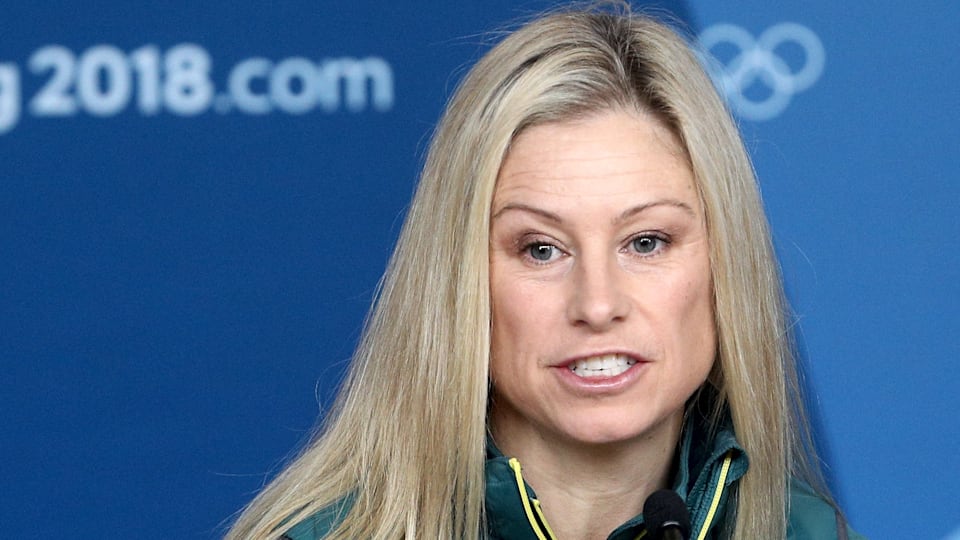The Alisa Camplin 'resilience toolkit' we all need right now
The Australian aerial ski champ once won an Olympic gold medal on two broken ankles. Now she's helping others to build resilience and mental well-being.

Alisa Camplin's story is incredible and inspirational.
Yes, she became Australia’s first-ever female Winter Olympic gold medallist in freestyle skiing aerials at Salt Lake City 2002.
And yes, she went on to become world champion, a world record holder, and bronze medallist at the 2006 Turin Games.
But how she did it is truly inspiring.
Coming from a country with very little snow, Camplin didn't even take up skiing until she was 20, in 1994.
Eight years later, she made her way to the top of the podium at the Olympic Games despite having fractures on both ankles.
In fact, during her career Camplin dealt with two broken ankles, two knee reconstructions, nine cracked ribs, and a number of concussions.
She has also suffered adversity in her life after sport, losing her first son to congenital heart disease.
Now Camplin - who was the Australian team's performance manager at PyeongChang 2018 - works at motivating, inspiring, and helping others, applying lessons learned from her journey as an athlete to everyday life.
She told Australian radio station 2GB that she achieved what she did in sport by “controlling and maximising my mind as well as my body”.
The Olympic champion has created a ‘resilience toolkit’ featuring free lessons on ways to use empathy, impulse control, and realistic optimism, among other things, to improve your life and the lives of those around you.
"We get physios and doctors to help us when we break a bone but, my word, did my life change when I had a psychologist to help me with my head." - Alisa Camplin
Learning resilience
Resilience was central to Camplin's sporting career.
In 2002, she defied doctors by competing in Salt Lake City.
And what she thought was bad bruising to her ankles actually turned out to be two fractures.
"It's a sport of highs and lows, but to be fair the physical things were sometimes easier to get through than the emotional or mental barriers."
Camplin wasn't even supposed to compete in 2002, with Australian hopes resting on former world champion Jacqui Cooper.
But when Cooper was forced to withdraw through injury, Camplin stepped in and stepped up.
The night before the final she was so nervous that she couldn't eat, but another extraordinary Australian victory gave her courage.
Remember Steven Bradbury's gold medal in short track speed skating when all of the skaters ahead of him crashed out in a spectacular pile-up?
That was Australia's first ever Winter Olympic gold and, coming two days before Camplin's final, took the pressure off her.
Speaking just after clinching gold, she said, "When he came through, it almost pleased me that I didn't have to go out and do this.
"I knew that was a big thing my nation was trying to chase. When Steven did it, I was like, 'Good, I don't have the weight of the nation on my shoulders.'"
The importance of resilience and mental well-being
Camplin put together two high quality jumps in the final to finish three points ahead of her rivals and claim Olympic gold.
As she was on her way to give reaction to waiting reporters, she managed to trip over her skis and fall.
There have been plenty of peaks and troughs along the way and Camplin has compiled the lessons she's learned all in a free online guide to resilience in the workplace.
It comprises eight chapters: Emotional awareness and regulation, empathy, impulse control, flexible and accurate thinking, self-efficacy, realistic optimism, stretching for growth, and connectedness.
Camplin cannot stress enough the importance of the mental side of preparation in sports and life in general.
She told 2GB, "For me, probably the greatest thing that unlocked my potential was when I started working with a performance psychologist.
"I was able to acquire tools and techniques that unlocked my mindset and set me up to focus on what I can control and regulate under pressure and find my courage and trust within myself to be the ultimate athlete that I could be."
Now 46, Camplin has experienced lows in her life since sport as well, with she and husband Oliver Warner suffering the loss of their first son, Finnan, when he was 10 days old.
Reflecting on that harrowing event, she said, "Getting through that grief and being able to bounce forward and to find silver linings and ways to move through that, it's exactly the same skills."
You can read and download the free guide here and there are many more tips for well-being on her website, AlisaCamplin.com.
